The Persian Princess is a 1708 tragedy by the British writer Lewis Theobald. It was performed at the Theatre Royal, Drury Lane. It is also written as The Persian Princess: or, The Royal Villain.

The Royal Convert is a 1707 tragedy by the British writer Nicholas Rowe. The play is set in England during the Saxon era featuring two brothers in a love triangle with a young Christian woman.
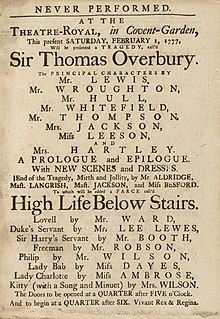
Sir Thomas Overbury is a 1723 tragedy by the British writer Richard Savage. It is based on the life of Thomas Overbury an associate of the Jacobean royal favourite Robert Carr whose apparent murder while incarcerated in the Tower of London provoked a trial and major scandal.
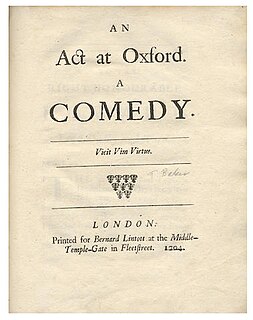
An Act at Oxford is a 1704 comedy play by the English writer Thomas Baker. Although scheduled to appear at the Theatre Royal, Drury Lane that year it had censorship problems from the Lord Chamberlain, likely through the influence of the Oxford University authorities. Although performed earlier it did not have its London debut at Drury Lane until October 1705 under the alternative title of Hampstead Heath.
Squire Trelooby is a 1704 farce by the writers William Congreve, John Vanbrugh and William Walsh. All were members of the Kit-Cat Club and another member Samuel Garth wrote a prologue. It was inspired by the French play Monsieur de Pourceaugnac by Molière.
Fatal Extravagance is a 1721 tragedy by the British writer Aaron Hill. It was presented by another writer Joseph Mitchell, a friend of Hill, at the Lincoln's Inn Fields Theatre in London. The original cast included James Quin as Bellmour, Anthony Boheme as Courtney, John Ogden as Bargrave and Anna Maria Seymour as Louisa. It was printed with the slightly longer title The Fatal Extravagance.
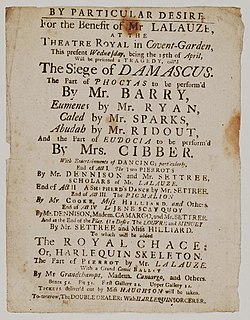
The Siege of Damascus is a 1720 tragedy by the British writer John Hughes. It was inspired by Simon Ockley's 1708 study Conquest of Syria, and focuses specifically on the Siege of Damascus in 634.
The Captives is a 1724 tragedy by the British writer John Gay. The action takes place in the ancient Median Empire, following the fashion in many tragedies of the era to have oriental settings. It concerns a plot against the King, which involves his wife and two royal Persian captives.
Money the Mistress is a 1726 comedy play by the Irish writer Thomas Southerne. It was his final play.
Gabriel Odingsells (1690–1734) was a British playwright.
The Independent Patriot is a 1737 comedy play by Francis Lynch.
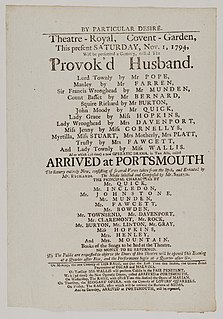
The Provoked Husband is a 1728 comedy play by the British writer and actor Colley Cibber, based on a fragment of play written by John Vanbrugh. It is also known by the longer title The Provok'd Husband: or, a Journey to London.
All Alive and Merry is a 1737 comedy play by the British writer Samuel Johnson. The original Lincoln's Inn Fields cast included William Giffard, Charlotte Charke and Anna Marcella Giffard. It was staged by Henry Giffard's company which had recently moved from the Goodman's Fields Theatre in Whitechapel.
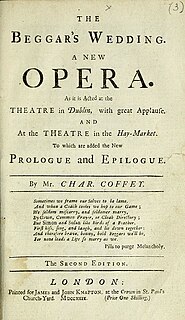
The Beggar's Wedding is a 1729 ballad opera by the Irish writer Charles Coffey. Part of a boom in ballad operas following the success of John Gay's The Beggar's Opera, it originally premiered at the Smock Alley Theatre in Dublin in March 1729 before appearing in London at the Haymarket Theatre on 29 May 1729 The original Dublin cast included Richard Elrington.
The Tuscan Treaty is a 1733 tragedy by the British writer William Bond also known by the longer title The Tuscan Treaty: or, Tarquin's overthrow. It is set during the time of the Overthrow of the Roman monarchy.

The Country Lasses: or, The Custom of the Manor is a 1715 comedy play by the British writer Charles Johnson.
Sir Walter Raleigh is a 1719 tragedy by the British writer George Sewell. It is based on the downfall of Walter Raleigh a successful courtier and sailor in the reign of Elizabeth who was executed in the reign of her successor James I. It was originally staged at the Lincoln's Inn Fields Theatre, one of the two patent theatres operating in London.
Everybody Mistaken is a 1716 comedy play by the British writer William Taverner. The title is also written as Every Body Mistaken. A farce, it is a reworking of The Comedy of Errors by William Shakespeare.
Adventures in Madrid or The Adventures in Madrid is a 1706 comedy play by the English writer Mary Pix. It was her final staged work.
The Lying Lover; Or, The Lady's Friendship is a 1703 comedy play by the Irish writer Richard Steele. It was his second play, written while he was an army office doing garrison duty in Harwich during the War of the Spanish Succession. It is described as being both a restoration comedy and a sentimental comedy, and marked the transition between the two.







